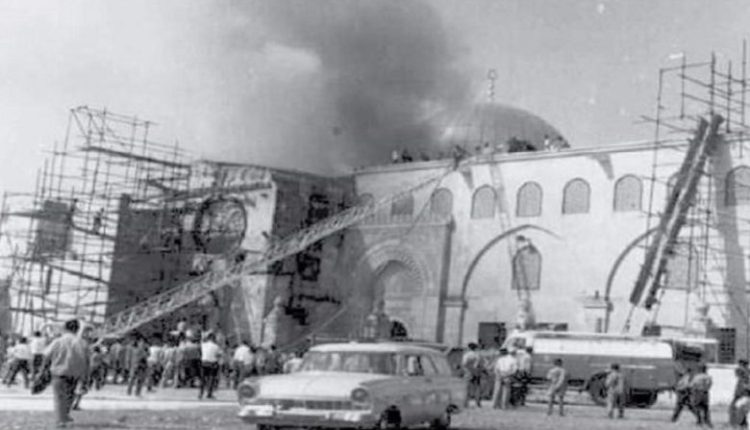On the 56th Anniversary of Its Burning: Al-Aqsa Between Zionist Fire and the Nation’s Silence
The fire of August 21, 1969 never truly went out. It became an ongoing plan devouring Jerusalem and Palestine each day. That blaze was not an isolated crime but a Zionist decision—a declaration of war on the holiest sanctuary of the Muslim nation. On that day, the sons of Palestine stood alone, encircling the flames and defending their mihrab, while the armies and peoples of the wider Ummah were absent from the battlefield.
Today, more than half a century later, Al-Aqsa repeats its cry: either the nation rises, or the enemy will continue burning the land and its sanctities without restraint.
A Crime Never Forgotten: When the First Qibla Burned
On Thursday, Jumada al-Akhirah 8, 1389 AH (August 21, 1969 CE), the Zionist enemy committed a heinous crime that shook Muslim hearts: the burning of the blessed Al-Aqsa Mosque. Flames consumed the southeastern section, destroying the historic pulpit from which Salah al-Din once delivered his sermons, and inflicting massive damage on its mihrab and roof.
The fire was no mere incident. It was a turning point that exposed the limitless scope of the Zionist project. Targeting the First Qibla and the third holiest mosque in Islam has always been a central goal in the occupier’s ideology, even before the establishment of its usurping entity.
An Old Plot: The Temple on the Ruins of Al-Aqsa
Even before the Zionist entity was born in 1948, Jewish intellectual circles declared their intent to demolish Al-Aqsa and build the so-called “Temple.” In the Jewish Encyclopedia (London, 1904), it was written: “The Jews are uniting their resolve to march upon Jerusalem and restore worship in the Temple.”
During the British Mandate in Palestine, leaders of the Zionist movement openly demanded control of the Haram al-Sharif. A Jewish British minister even declared that the day of rebuilding the Temple was very near and that he would dedicate his life to it. With the declaration of Israel in 1948, those words turned into actions: confiscations, excavations, Judaization, and unprecedented boldness that reached its peak with the full occupation of Jerusalem in 1967.
Incitement and Preparations for the Blaze
Less than a month before the crime, Zionist newspapers published inflammatory articles calling openly for the removal of Al-Aqsa. La Merhav wrote: “The Islamic sanctities must be seized, no matter the cost.”
At the same time, the occupier escalated its measures—demolishing adjacent waqf properties, seizing Bab al-Maghariba, sending its soldiers into the mosque compound with their boots, and beginning dangerous excavations under its foundations, reaching depths of 40 feet and threatening its collapse.
The Day of the Crime: Flames Engulf Al-Aqsa
On August 21, 1969, Australian extremist settler Michael Dennis Rohan, backed by the occupation authorities, stormed the mosque and set fires within. The eastern halls of Al-Aqsa blazed, and the flames devoured the pulpits of Nur al-Din and Salah al-Din. Meanwhile, the Zionist authorities cut off water supplies to the area and prevented Arab fire trucks from reaching the site.
But the Palestinians performed an epic rescue, rushing with courage to contain the blaze and prevent the mosque from being consumed entirely. Despite the clarity of the crime, the Zionist regime fabricated a mock trial for the criminal, eventually acquitting him and deporting him back to Australia, as if he had not torched Islam’s First Qibla!
Yesterday’s Silence… Today’s Crimes
Fifty-six years later, it is clear that the burning of Al-Aqsa was only the beginning of an ongoing series of crimes: daily incursions, Talmudic prayers in its courtyards, Judaization of its surroundings, and relentless excavations beneath its foundations.
The Islamic Jihad Movement emphasized: “The silence of Arabs and Muslims at that time paved the way for today’s crimes. Had the Ummah acted with historical responsibility then, we would not be facing the declaration of ‘Greater Israel’ today.”
No Legitimacy for the Enemy… The Voice of Resistance Rises
Hamas, in its statement, stressed: “The enemy has no sovereignty and no legitimacy over a single inch of Al-Aqsa. Jerusalem will remain the eternal capital of Palestine.” The movement called for serious Arab and Islamic action to halt the occupier’s schemes, turning the anniversary of the fire into a moment for escalating both popular and official anger against the occupation.
Al-Aqsa: A Cause of the Ummah, Not of One Nation Alone
The blessed Al-Aqsa Mosque is not a mere Palestinian concern—it is the cause of the entire Ummah, from besieged Gaza to the West Bank and Jerusalem, and across every Arab and Muslim land. Defending Al-Aqsa is defending identity, dignity, and existence.
If the crime of arson 56 years ago ignited a cry in the heart of the Ummah, today’s ongoing violations demand that its peoples turn that cry into action—writing with their presence and steadfastness the next chapter in the battle for Jerusalem.

